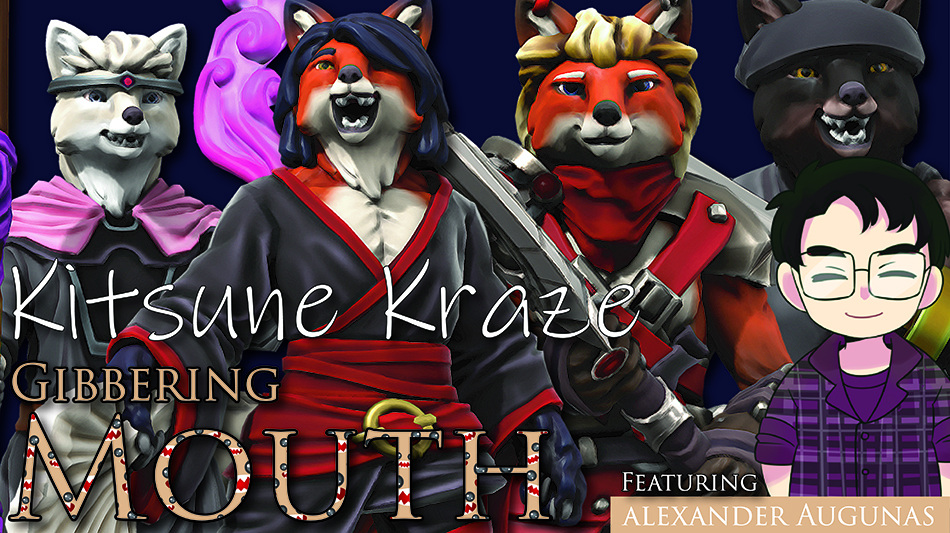Welcome to Guidance, Private Sanctuary’s source for tips and techniques for the Pathfinder Roleplaying Game, written by Everyman Gamer Alexander Augunas. Today, we’re going to be talking about encouraging roleplaying at the gaming table.
Recently on the Paizo forums, I saw a Pathfinder Society thread asking a simple question, “How can we get more roleplaying to happen at our tables?” I saw lots of replies in that thread. Some of them were helpful, some of them made me say, “No, why. Why would you suggest that?”
Before I start this article, I want to note that I have always come from a group of gamers who were both VERY roleplay-heavy and VERY much optimizers/power gamers/rules mongrels. It actually never occurred to me that you could play the game without roleplaying until I joined Giant In the Playground’s online communities, and I never actually saw that type of play at the table until I started playing PFS (so like two years ago). With that in mind, I’ve had to use many strategies to acclimate people to my roleplaying heavy style of GMing (which is more prevalent in home games than in PFS, but I try to get a fair bit of roleplaying in at the PFS table where I can too).
Roleplaying is Contagious
When you’re at a table with a group of good roleplayers, its REALLY hard not to get sucked in even if you’re not good at roleplaying yourself. A group of strong roleplayers turns a bunch of nerds sitting around a table into an epic, 3D experience, like sitting on set during the shooting of a Game of Thrones episode. The energy is REALLY hard to ignore, and people who experience it long enough are slowly going to find an itch they’ve just got to scratch—they’ll want to join in, especially if they’re part of the experience too.
It’s important to remember that different people have difference levels of what they’re comfortable with, but usually new roleplayers start small. They offer a good in-character comment or two, or start projecting simple character traits to the party. They grow, they build, they observe, and eventually they improve. In essence, “roleplaying” is a skill that builds itself up, a small trickle that turns into a flood. It isn’t a magic “on/off” switch, just like I can’t magically decide, “Hey, I’m going to run a 5k relay tomorrow because my athletic friends all really want me to do it.” You start small with your exercise, you find something that you’re comfortable with, and you grow. And maybe in a year you’ve improved enough and grown confident enough to run that 5K. But its never an instant transformation—not for a relay runner, and not for a roleplayer.
Roleplaying Bennies
Another great way to get people to try roleplaying is to give them real, tangible benefits in game for roleplaying (that’s basically what the term “benny” means). Now, giving a successful benny for roleplaying is difficult because you need to make sure that you are specifically rewarding the act of roleplaying, not a character’s build. For instance, giving a character a reward because she diplomatically resolved a situation doesn’t promote roleplaying if the situation was resolved because of a very high Diplomacy check. Instead, giving the players bonuses on skill checks and such for good roleplaying is better. For instance, if your player remembers a slight that would get under the foe’s skin and slings that slur when she charges, giving that player a benny as a bonus is an awesome idea. Her action (the charge attack) isn’t what was important—it was her choice of dialog to the table, and her choice to add dialog granted her something that she cares about or needs (a mechanical benefit).
The other trick with bennies is that you cannot flood the game with them. Giving lots of Bennies at the start to get someone open to the idea of roleplaying isn’t a bad idea, but continuing that all the time is. You don’t want your player to “farm” roleplaying for benefits. You want to help your player feel good about roleplaying by giving them an extra extrinsic reward for their behavior, and slowly transition the player from valuing the reward (the benny) to valuing the experience (roleplaying itself). That’s the real secret to changing behavior—get them hooked through positive reinforcement, then watch as the need to use said reinforcement slowly minimizes itself as the behavior internalizes.
Be Inclusive With Your Roleplaying
Oh man, this is an important one. Be inclusive with your roleplaying. This goes for all GMs and all players. No matter how much of a misogynistic slave-owning jerk you say your character is, roleplaying that sort of character isn’t going to make other people at the table feel comfortable and safe roleplaying with you. Remember, creating a fun experience for everyone is more important then you getting to play your beautiful brainchild character.
The easiest way to be inclusive with your roleplaying is to simply take advantage of every conversation that other start players in character, then encourage them to safely explore different facets of their own character while doing so. Give them ample room AND opportunity to grow as roleplayers, and do the same for yourself. If you spend all your time yaking about yourself with your GM and never give other people in the party opportunity to interact with NPCs, you are going to slowly suffocate the roleplaying at the table. Look for friends. Look for help. Look for fun.
Things NOT To Do
Just like there are things you SHOULD do, there are things you shouldn’t do when trying to get people to roleplay. Here are a few.
Don’t Put People on the Spot
NEVER randomly turn to someone who isn’t a roleplayer and just start trying to roleplay with them out of nowhere. This is like taking someone who doesn’t know how to ride a bike and giving them a sparklely new two-wheeler, dropping them off in the middle of downtown Philadelphia, and telling them to ride home to learn how to bike. Its horrifying. No one wants this.
Instead, look for signs that your non-roleplayer is trying to break into the scene and help them do it. Be the little jaggle tooth that helps the baby chick break free from its egg and into the bright world of roleplaying!
Don’t Shame New Roleplayers
NEVER criticize a new roleplayer’s decisions and choices in roleplaying. Criticism doesn’t build anything; it tears things down. Criticizing a new player is going to make them scared of trying to roleplay with you, or worse—with anyone. Don’t do it. After all, when you were a 15 year old kid in your Mom’s basement roleplaying for the first time, I guarantee you made some bad decisions and choices in roleplaying. We all have. (Exception: If the new roleplayer’s choices are making the game unfun and unsafe for people at the table, then it is your DUTY to the health of the gaming group to offer constructive criticism.)
Don’t Demand People Roleplay
Trying to force someone to use a skill they don’t have is insane. Don’t do this.
Don’t Put People on the Spot
One of the worst things you can do is randomly shine a spotlight on a non-roleplayer and ask them to, “Take it away.” They don’t want the attention because they’re likely not sure of themselves yet. Ask them if they’re comfortable trying, and explain to them why the party needs them to try. But don’t ever force roleplaying on someone. Its not kosher.
So, those are my best bits of advice on how to foster roleplaying at the gaming table. What do you think? What strategies have you used successfully, and which ones have backfired on you? Have you ever had a bad experience where a group tried to get you to roleplay when you weren’t ready? What did you do? Leave your answers and comments below, and I’ll see you next week for another new episode of Guidance! Take care.
Alexander “Alex” Augunas has been playing roleplaying games since 2007, which isn’t nearly as long as 90% of his colleagues. Alexander is an active freelancer for the Pathfinder Roleplaying Game and is best known as the author of the Pact Magic Unbound series by Radiance House. Alex is the owner of Everyman Gaming, LLC and is often stylized as the Everyman Gamer in honor of Guidance’s original home. Alex also cohosts the Private Sanctuary Podcast, along with fellow blogger Anthony Li, and you can follow their exploits on Facebook in the 3.5 Private Sanctuary Group, or on Alex’s Twitter, @AlJAug.






